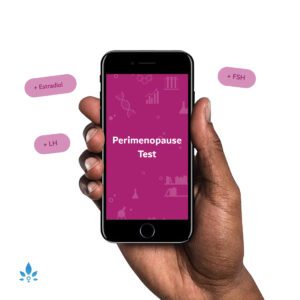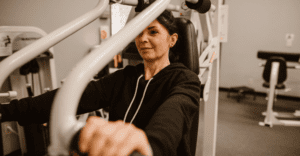Getting Through the Menopause: top Tips for Couples


Menopause symptoms can put a strain on your relationship. Here are tips for coping together…
Changing hormones can cause a variety of uncomfortable symptoms, from hot flushes (hot flashes) and night sweats, to vaginal dryness and mood swings. These issues, together with other mid-life stresses, can sometimes put significant pressure on a relationship.
In addition, there may be other big changes happening in the mid-life years, such as the children leaving home, or caring for ageing parents, which can add to the pressure.
The good news is, there are things you can do to help deal with these problems, and retain your intimacy and sense of togetherness as a couple. Here are some top tips to help you get through the menopause together…
Learn about the menopause together
Knowing what to expect can be very helpful for both parties. During menopause, fluctuating hormones can cause a wide range of physical issues, including night sweats, vaginal dryness, headaches, sore breasts, irregular periods, weight gain, fatigue and difficulty sleeping. It can also cause emotional and cognitive problems, including mood swings, ‘brain fog’, anxiety and depression.
Dealing with these issues can have a big impact on a relationship. Researching the menopause together can help you anticipate potential challenges and look for ways to help reduce them. Try doing some research online, or looking at magazine articles together. There are also many books covering all aspects of the menopause, which you could read together – from self-help guides to health-boosting recipes.
You can view a range of Live Better With recommended books to help with understanding and managing the menopause here.
Be patient with each other
During the menopause, a woman can experience a range of different emotions and physical symptoms, and may become overwhelmed. When emotions are running high, it can be all too easy to take things personally.
It’s important to be patient and supportive of each other, and to try to remain non-judgmental and see things from your partner’s point of view. Try to remember the root cause of the problem, and that this stage won’t last forever.
It can also help to offer each other regular reassurance, to let your partner know that you still love them, and it’s not their fault, and look for ways to show each other that you still care.
Make adjustments to your sexual relationship
The menopause can cause issues with sex and intimacy. Changing hormones can cause a dip in a woman’s sexual desire (or libido), and falling levels of oestrogen can cause the vaginal area to become less lubricated, meaning that sex may become painful.
On top of this, fatigue, depression or problems with body image can also affect a woman’s confidence and her desire to have sex.
With all this going on, it can be easy for the sexual side of a relationship to break down and for resentment to develop. It’s important for couples to keep the lines of communication open, and if necessary look for other ways to be intimate. You can read our article on how to cope with painful sex during menopause here.
If vaginal dryness (or atrophy) is an issue, there are some great lubricants, moisturisers and other products that can help to improve things. You can see a range of Live Better With recommended products to help with vaginal dryness and low libido here. And see our guide to the best intimate aids here.
Make things as comfortable as possible
One common problem that couples can find particularly challenging is dealing with night sweats – excessive episodes of sweating at night, which are caused by hormonal changes. This can be the cause of many a night-time dispute, with one partner wanting to fling open all the windows while the other is desperately clinging on to the duvet!
Problems with night sweats and insomnia can also lead some couples to sleep apart, making it even more difficult to maintain intimacy.
However, there are lots of things you can do to help make things more comfortable at night, such as installing a fan, and using lighter bedding made from cotton or bamboo, which are naturally soft and moisture-wicking. You could even try using separate duvets on the same bed for a while!
You can view a range of Live Better With recommended products designed to help with getting a good night’s sleep here.
Find other ways to stay close
If sex is proving difficult, you can look for other ways to stay close and maintain a sense of togetherness as a couple. Try to concentrate on building up the romantic and sensuous side of your relationship.
Going on a romantic dinner date, enjoying a massage, or cuddling up on the sofa and watching a movie can help to create togetherness and build confidence, without any additional pressure.
Take up a new hobby
Sharing a hobby can help you to feel more connected as a couple, and give you a sense of common interest. You could try starting a new hobby or learning a new skill together, such as cooking or pottery, or doing something physically active such as walking in the country, or exercise classes.
Exercise can also help with some menopause symptoms, including weight issues and hormonal imbalances.
Keep talking – and listening
Menopause is a natural phase of life. For some women it marks a new freedom, as periods come to an end and the risk of pregnancy diminishes. For others, it can be a difficult and challenging time.
Either way, it’s important to remember that this phase will come to an end, and it can help to share any changes or concerns you may be feeling. Men can also face changes at this time of life, including declining levels of testosterone, which can affect emotions, libido and sexual performance, as well as other health and ageing issues.
If you can deal with it together you may find you become even closer, and this will help you enjoy a healthy and loving relationship in the years to come.
Finally, if you do find that you’re struggling to cope as a couple, it might be time to get some help from a specialist. Counselling can help many couples to deal with the symptoms of the menopause and other mid-life challenges.
About Live Better With
This article was originally written and published by our partner Live Better With.
Live Better With’s mission is to make everyday living a bit better for the millions of people living with long term health conditions, all over the world. We do this through thousands of curated products, informative content, useful services and a thriving online community. Visit Live Better With here.













































